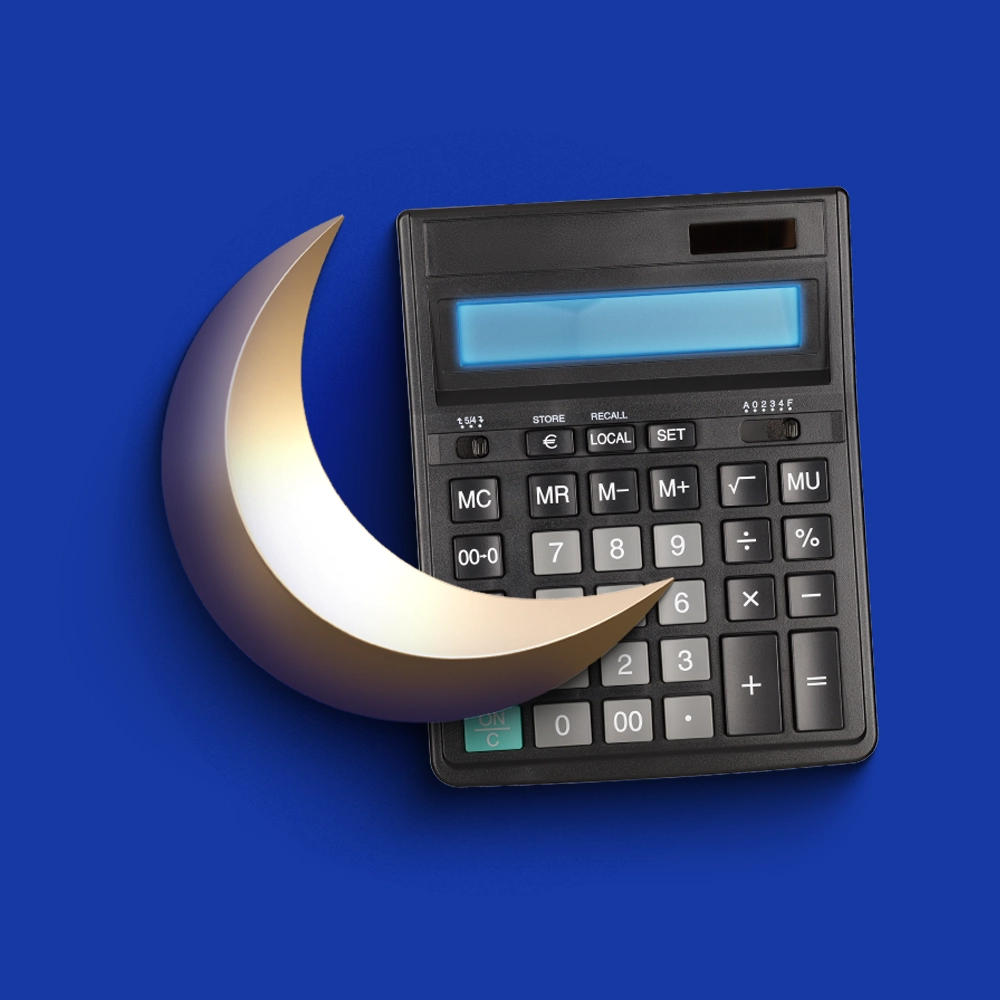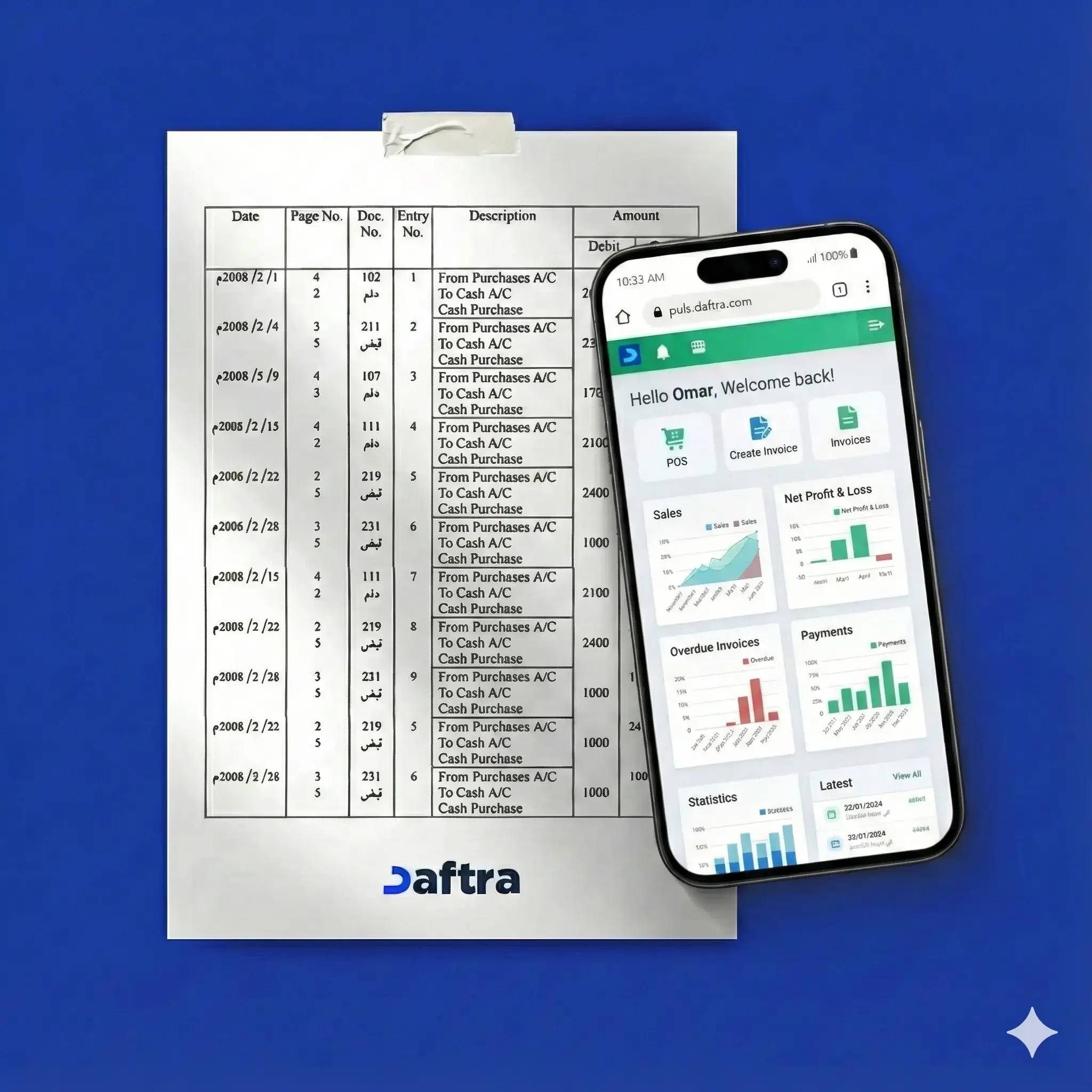What is Islamic Accounting and Its Most Important Accounting Standards

Table of contents:
- Summary of Key Points
- What is Islamic Accounting?
- How Did Islamic Accounting Originate?
- What is the Importance of Islamic Accounting?
- What are the Standards of Islamic Accounting?
- What are the Fundamental Principles of Islamic Accounting?
- What are the Methods of Accounting in Islamic Financial Institutions?
- What is the Difference Between Islamic and Traditional Accounting?
- What is the Difference Between Islamic Banks and Traditional Banks?
- What is the Importance of Accounting and Auditing Standards for Islamic Financial Institutions?
- What are the Most Prominent Standards of the Accounting and Auditing Organization for Islamic Financial Institutions?
- How Do You Follow Islamic Accounting Principles Easily Through Daftra?
- Frequently Asked Questions
The beginning of Islamic history and the spread of Islam among nations and societies marked the very beginning of differences in financial transactions between the accounting methods advocated by Islam and the accounting methods that society followed at that time. To this day, there remains an objective difference between Islamic accounting standards and current international standards.
The Islamic accounting software has proven its merit in comparison to other accounting software, some of which have collapsed and been forgotten over time. Throughout this period, the Islamic accounting software has served as a successful and exemplary model for other cultures and societies to the extent that they have adopted some accounting principles from this software. Many Western scholars have expressed their admiration for the Islamic accounting software in numerous books, not only as an accounting software that regulates finances between people, but also because it is built upon fundamental values and principles.
What follows covers the importance of Islamic accounting, its principles, its most prominent standards, and the key differences between Islamic and traditional accounting.
Summary of Key Points
- Islamic accounting, in brief, is one of the branches of accounting that organizes financial transactions and accounting operations according to principles and standards derived from Islamic Sharia, ensuring the achievement of justice and equality among all members of society.
- The importance of Islamic accounting lies in ensuring compliance with Islamic Sharia commands, applying the principle of comprehensiveness to various accounting practices, increasing transparency, reducing crimes and illegitimate financial activities such as fraud, usury, gambling, and others, and achieving a balance between profitability and the public interest of society.
- There is a set of basic standards that regulate the work of Islamic accounting, which are non-recognition of interest or usury, the legitimacy of trade or projects financed by Islamic banks, zakat, and takaful.
- Islamic accounting relies on two fundamental principles: reliance on Islamic Sharia and achieving justice.
- The difference between Islamic accounting and traditional accounting lies in the way of dealing with financial data and interpreting it, the limits of making financial information available to specific individuals, and following the Sharia accounting approach that follows the principle of first determining whether something is halal or haram, unlike traditional accounting, which follows the principle of interest and profit achievement.
What is Islamic Accounting?
Islamic accounting, or “Sharia accounting”, is an accounting software that works to organize financial transactions according to Islamic principles derived from the specific rules in Islamic Sharia.
Working with the Islamic accounting software requires applying justice and equality in distributions and financial transactions among all individuals, and not discriminating between contracting parties. It also adopts transparency and disclosure as its principle, which means the necessity of disclosing all financial information related to activities and business operations among all concerned parties to build trust and credibility between them.
The Islamic accounting software takes Sharia as its methodology and guiding reference in accounting work, which ensures the absence of any activities that violate Islamic Sharia, such as usury, fraud, illegitimate speculation, gambling, and games of chance.
In summary, the answer to the question of what Sharia or Islamic accounting is is that which is completely based on Islamic teachings and the examination of the legitimacy of all operations that take place, with accounting being completely founded on Islamic rules.
How Did Islamic Accounting Originate?
Many may search for how Islamic accounting originated, and simply put, Islamic accounting essentially arose based on the necessity of having an accounting software that aligns with Islamic values and principles.
Its history dates back to the early Islamic eras from the fifteenth century, extending into the Ottoman period, and since that time, Islamic accounting began developing in parallel with the development of the Islamic economic software.
The development of Islamic accounting has continued through the ages, and to this day, this accounting software is being developed alongside the evolution of international standards and general accounting principles.
The developments in Islamic accounting came to align with societal change while continuing to maintain reliance on Islamic standards, which aim to provide an integrated accounting framework that complies with Islamic principles that encourage achieving balance in financial transactions, controlling expenses, and preserving financial resources through rational spending and providing surplus to serve society's interests.
Now, many financial institutions and banking authorities are working to develop Islamic accounting standards in a way that suits business needs and does not contradict the teachings of Islam, and are adopting them on a global scale in accounting operations and all financial management affairs.
What is the Importance of Islamic Accounting?
After learning about Islamic accounting and its origins, an important question arises: "What is the role and importance of Islamic accounting?" in business and society in general. In a few simple points, we will clarify this importance and the value of Islamic accounting:
1- Compliance with Islamic Sharia Commands
One of the most influential roles of Islamic accounting in a Muslim's life is this type of accounting's compliance with Islamic commands, which is considered an obligation for every Muslim.
2- Benefiting from Islamic Wisdom
In the presence of halal and haram, Islamic accounting helps in benefiting from this matter and submitting to the principles of halal and haram.
3- Comprehensiveness
The structure of the Islamic accounting software includes different types of software, guidelines, and accounting practices.
4- Increasing Transparency and Improving Work Ethics
Thanks to adhering to Islamic instructions and applying them in accounting, this makes work more transparent, and commitment to work ethics becomes clearly evident.
5- Absence of Individual Interests
Thanks to the absence of individual interests in applying Sharia accounting, this helps eliminate individual greed that some individuals and officials seek through applying traditional accounting.
6- Enhancing Trust and Integrity of the Financial Software in Accounting
The presence of integrity in the financial software achieves a balance between profitability and the public interest of society.
7- Controlling Financial Crimes
Controlling crimes related to fraud, theft, forgery, and deception, as a result of carefully examining financial transactions and ensuring their compliance with Islamic Sharia provisions. After explaining the great impact that Islamic accounting has, which consists of reducing financial crimes and increasing transparency and trustworthiness, in addition to promoting public interest, we have understood why Islamic accounting is considered important.
What are the Standards of Islamic Accounting?
To apply Islamic accounting correctly, one must know its standards well and apply them accurately, and we will simply clarify the rules and standards of Islamic accounting:
1- The Absence of Interest or (What is Known as Riba in Islamic Sharia):
The Islamic banking software prohibits borrowing with interest or depositing for annual or monthly interest; this is because Islamic Sharia, upon which Islamic accounting is based, prohibits this according to the text of the Quran and Sunnah.
2- Legitimacy of Trade or Projects Financed by Islamic Banks
When project documents are submitted by a person or institution to obtain financial funding, the tasks of the Islamic banking software are not only to ensure the existence of financial assets, but also to examine the project's feasibility study and other traditional banking procedures. There is another procedure that is specific to the Islamic accounting software, which is ensuring whether this project is halal or not.
This step also comes in compliance with Islamic Sharia commands and Islamic accounting controls, and by adhering to these commands, we will obtain a society free from any corrupt business or trade.
3- Zakat:
Zakat is a fundamental pillar of Islam, and this particular aspect is one of the most important fundamentals that Islamic banks comply with because it achieves social balance between different social classes.
Money is distributed and takes its natural cycle of spending, operation, and earning, and is not present only in one entity, which is known as "hoarding," as often happens in traditional accounting software.
Note: There is a difference between tax and zakat:
- Zakat is a legislative pillar; compliance with it is an obligation toward God to achieve social justice.
- Tax is a social obligation toward the state to achieve national and social balance.
4- Takaful:
Takaful is a term built upon another term, which is Islamic insurance.
Islamic insurance is an agreement between two people, or a person and an institution, or between two institutions; one of the parties is exposed to a risk or threat of some kind. This threat may be a social threat, such as the danger that threatens the poor, and the agreement is that one party guarantees the other threatened party.
This is done through the Takaful fund, which is similar to a donation fund, but it is actually a contribution fund from which compensation is taken for the other party for the insured damage.
The term Takaful is an Islamic term that depends on Islamic banking transactions based on Islamic principles that call for protecting members of society and spreading goodness through the principle of Takaful.
What are the Fundamental Principles of Islamic Accounting?
The principles of Islamic accounting are based on two extremely important things: Islamic Sharia and justice. We will explain this in a simple yet detailed manner. Here are the foundations and principles of Islamic accounting:
1- Reliance on Islamic Sharia:
Islamic accounting takes Sharia as its methodology and principle, meaning it applies all its conditions according to what Islamic Sharia permits or prohibits. This is based on the belief that prohibition or permission contains divine wisdom for humans on an individual level, and wisdom for the society in which they live on a broader level. Relying on the principle of Islamic Sharia makes managing banking transactions easier in order to achieve a fundamental goal, which is goodness alone.
2- Achieving Justice:
No matter how economic circumstances and the goals of capitalist societies change, the Islamic banking software remains steadfast on the most important of its principles, which is achieving justice for its individuals.
Others' money or trade is not exploited for personal interests or undeserved benefits.
What are the Methods of Accounting in Islamic Financial Institutions?
The methods of applying accounting in Islamic financial institutions depend on following the standards of the Accounting and Auditing Organization for Islamic Financial Institutions (AAOIFI), and these are the most prominent steps and methods followed for Islamic accounting:
1- Receiving Cash Deposits
One of the most important methods of accounting in Islamic financial institutions is receiving various cash deposits from clients and investing them while bearing risk jointly in case of loss.
2- Speculation with Depositors' Funds
Trading and speculation with depositors' funds while prohibiting lending them.
3- No Interest Earned
Neither the financial institution nor the client receives interest from the other party according to the nature of the financial transaction, and Islamic financial institutions do not impose penalties for delayed payment or settlement.
4- Commitment to Current Accounts Only
Only current accounts represent obligations on Islamic financial institutions.
5- Measurement and Evaluation
Measuring and evaluating projects and assets based on financial indicators such as Return on Investment (ROI) and Return on Assets (ROA) with the aim of evaluating project performance and achieving financial goals.
Thus, we can summarize the methodologies of accounting in Islamic financial institutions as working on measuring and evaluating projects, speculation, the absence of interest, and speculation with depositors' funds.
What is the Difference Between Islamic and Traditional Accounting?
Through two things, we can understand the differences between Islamic accounting and traditional accounting - they differ in the methods of dealing with data and accounting approaches. Here are the simplified and detailed differences between Islamic and traditional accounting:
1- Method of Handling, Interpreting, and Classifying Data
Both Islamic accounting and financial accounting receive client data and business activities, and both must study this data thoroughly regarding its accuracy and effectiveness to ensure investment in the banking accounting software.
However, the first fundamental difference is that the Islamic accounting software clearly shares all banking operation data with its clients, unlike the traditional accounting software, which only shares very simple, selected, and abbreviated information.
2- Sharia Accounting Approach
The other fundamental difference is reliance on Islamic Sharia. Unlike other banking software, banks that rely on Islamic Sharia differ in their way of handling data, as they look at it first with the principle of whether it is halal or haram, unlike traditional banking software, which looks at data first through the lens of interest.
Note: There is a misconception among some that the traditional accounting software is more comprehensive than the Islamic accounting software, and therefore, the Islamic accounting software cannot be used at the international level.
The reality is that the only unique difference between the traditional accounting software and the Islamic accounting software is that the Islamic accounting software is based on Islamic legislation, so we find that some transactions, such as profit and loss management, and interest differ between the two software.
Other than that, the Islamic accounting software can manage all personal, commercial, and tax transactions and any other item that falls under the financial or banking aspect, and the evidence for this is the adoption of the Islamic accounting software by many famous international banks today.
| The Daftra software helps in applying Islamic accounting and provides all the accounting tools that help you follow Islamic Sharia while simultaneously recording all your transactions and obtaining an integrated software and accurate reports easily. |
We see from this that the difference appears in dealing with and sharing data, in the Islamic type with clients in detail, while in the traditional one, the sharing is less, and transactions are conducted on a completely Sharia basis. Thus, we know how Islamic accounting differs from traditional accounting.
What is the Difference Between Islamic Banks and Traditional Banks?
We can summarize the differences between Islamic and traditional banks in that Islamic banks are institutions that accept money on the basis of murabaha, and all their transactions depend on Sharia rulings, but they cannot obtain self-financing due to the absence of interest. In addition to this, they bear losses with the client.
As for traditional banks, they are completely monetary institutions that depend on lending with interest rates, and can obtain self-financing. Additionally, their profit comes from interest, and they do not bear losses with the client - the loss falls on the client alone.
Now we will explain the differences between Islamic and traditional banks in detail:
| Comparison Aspect | Islamic Banks | Traditional Banks |
| Concept | It is a banking financial institution that accepts money based on the principle of murabaha, which is one of the types of Islamic financing that ensures providing capital in exchange for a share in profits. Islamic banks operate based on two fundamental principles: al-kharaj bil-daman (meaning the bank's obligation to compensate the client for project losses that are not resulting from poor management), and the second principle is al-ghurm bil-ghunm (based on which the Islamic bank retains part of the profits achieved from the client's project, with the aim of compensating the bank for potential financial risks in case profits are not achieved, and in case they are achieved, they are distributed between the bank and the work based on predetermined and agreed-upon percentages). | One of the forms of monetary institutions that deals in monetary credit and private banking transactions for commercial and financial papers, and has individual material objectives for trading in money through usury and interest with the aim of maximizing wealth. |
| Nature and Character of Dealings | Practices banking tasks and financial intermediation in all forms that comply with Islamic Sharia provisions, whether as seller, buyer, or partner, and rents banking services based on (trust funds), so it deals with the current account holder, considering the good loan or al-kharaj bil-daman, and the investment account holder is the capital owner. | It is an intermediary between savers, depositors, and investors, and relies fundamentally on the basis of lending with interest rates. |
| Internal and External Financial Resources | Islamic banks cannot finance themselves by issuing shares, due to the usurious interest resulting from them, but they can issue sukuk as a means of collecting financing, and they do not lend or borrow with interest. Accounts are divided into two types: the general demand account, which is established based on absolute mudaraba, and the special demand account, which is established based on restricted mudaraba. | Traditional banks can self-finance by issuing preferred shares or external financing through deposits and loans with interest. |
| Profit | Achieved through capital, guarantee, and work according to Islamic Sharia foundations. | Achieved from the difference between debit and credit interest in banking transactions. |
| Loss | Borne by both the bank and the client if the causes are beyond the client's management, such as Islamic banks bearing losses related to the capital owner in mudaraba, and in case of market transfers. | The borrower alone bears the loss, even if it was for reasons beyond their control. |
| Oversight | Oversight is from the central bank, the general assembly, the auditor, and the legal monitor, in addition to the existence of Sharia oversight to ensure compliance with Sharia controls. | Traditional banks share with Islamic banks in implementing oversight work by the central bank, the general assembly, the auditor, and the legal monitor. |
What is the Importance of Accounting and Auditing Standards for Islamic Financial Institutions?
The Accounting and Auditing Organization for Islamic Financial Institutions (AAOIFI) has established a set of standards that regulate operations and transactions in Islamic financial institutions. The role of accounting and auditing standards for Islamic financial institutions appears in:
1- Ensuring Compliance with Islamic Sharia Principles
Regarding accounting operations, auditing, and review, and under these standards, the foundations and principles that must be followed have been clarified to ensure that financial activities are conducted according to Islamic Sharia rulings.
2- Enhancing Trust and Transparency Between Clients, Investors, and Islamic Financial Institutions
Through working according to a unified and recognized accounting framework, which allows for the exchange of financial information between concerned parties in a smooth and clear manner, it is possible to evaluate performance and financial risks.
These unified standards facilitate communication between Islamic financial institutions and each other, and their use for comparison purposes to evaluate the institution's position at the local and international level, and also facilitate communication with regulatory bodies, auditors, and financial analysts.
The "Accounting and Auditing Standards for Islamic Financial Institutions" help address emerging challenges due to dealing with accounting and financial matters such as sales, expenses, and complex financial transactions, which support the growth and development of Islamic financial institutions.
What are the Most Prominent Standards of the Accounting and Auditing Organization for Islamic Financial Institutions?
The Accounting and Auditing Organization for Islamic Financial Institutions establishes some measures and standards on which it is based. Here is a list of the most prominent of these standards:
- Presentation and disclosure of financial statements.
- Mudaraba financing.
- Musharaka financing.
- Murabaha and murabaha to the purchase order.
- Disclosure of profit distribution bases.
- Rights of investment account holders.
- Salam and parallel salam.
- Ijarah and ijarah ending in ownership.
- Zakat.
- Deferred sale.
- Investment in sukuk, shares, and similar instruments.
- Provisions and reserves.
- General presentation and disclosure of financial statements for Islamic insurance companies.
- Transactions and operations in foreign currencies.
- Islamic financial services are provided by traditional financial institutions.
- Subscriptions in Islamic insurance companies.
- Investment in affiliated entities.
- Investment in real estate.
- Disclosure of asset transfers.
- Investment funds.
- Bases for determining and distributing surplus in Islamic insurance companies.
- Consolidation of financial statements.
How Do You Follow Islamic Accounting Principles Easily Through Daftra?
Over long years and centuries, the Islamic accounting software has proven its uniqueness and efficiency, which places it in a different position among all global accounting software.
Since Daftra is primarily directed at Arab and Islamic countries, you will undoubtedly find facilities that help you implement the Islamic accounting software through the accounting program from Daftra, with sufficient knowledge of the differences between conventional software and Islamic accounting software. So don't worry about this matter, and follow the software you want, and don't forget that our technical support helps you in the customization and configuration process to get services that match what you want 100%.
In conclusion, it can be said that Islamic accounting, with its flexibility and continuous development, has been able to face the financial and accounting challenges in Islamic financial institutions, which achieve the principles of justice and transparency in financial transactions.
Through adopting the Islamic accounting approach, Islamic financial institutions can enhance their position and credibility by meeting the needs of clients and stakeholders in balanced and fair ways that align with noble Islamic values.
Frequently Asked Questions
What is the function of Islamic banks?
Islamic banks work on all financial and investment transactions, but in accordance with Islamic Sharia and its specific standards.
Why Islamic banks?
Because Islamic banks do not engage in any prohibited transactions, this ensures a feeling of safety towards the financial transactions you conduct. In addition to this, Islamic banks are real investment entities away from speculation, and Islamic banks share losses with the client.
What is Sharia accounting?
Sharia accounting is an integrated accounting software for companies, but under Islamic rules and commitment to them in all transactions that take place. Sharia accounting works to achieve justice and transparency in implementing all the company's accounting operations.
What are the types of financial contracts in Islam?
- Ijarah contracts.
- Sale contracts.
- Partnership contracts.
- Exchange contracts.
What are Islamic institutions?
Islamic institutions are institutions and companies that work in what serves Islam and its specific teachings, such as Islamic scholarly institutions, charitable institutions that help the needy and poor, or institutions responsible for serving the Islamic religion in all ways.
What are the prohibited financial transactions?
- Usury (riba).
- Gambling or games of chance.
- Taking money unlawfully.
- Deception and fraud in buying and selling.
What are the financial acts of worship?
- Charity.
- Hajj or Umrah.
- Spending in the way of Allah.
- Zakat.
- Participating with money in charitable works.
- Paying money to develop and improve society.
















